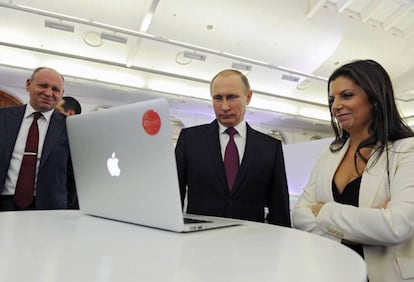RT, Sputnik and the new Russian war
Dubious sources, alarmist headlines and artificial audience bloating: how the Kremlin spreads fake news

News outlets funded directly or indirectly by the Kremlin have one objective and one objective only, admits repeatedly Margarita Simonovna Simonyan, the influential editor-in-chief of the Russian broadcaster RT and Rossiya Segodnya, the government-controlled agency which runs the Sputnik multimedia platform. Her work philosophy was made patently clear in a recent interview with the television program Pravo Znat in which she described her idea of the new world order as “alternative reality.”
“The Western world as we knew and appreciated it, with its Western values, no longer exists. There are no values: there is no Western world. What is left are authoritarian regimes under the cover of national flags,” she said.

Demonstrating that the West and its values no longer exist is the also the reason media outlets linked to the Kremlin exist. Liberal democracy, with its separation of powers and its electoral system has been replaced by the model of an authoritarian state driven by values like patriotism, according to Simonyan.
In their bid to discredit the West, the Kremlin’s media outlets have full confidence in digital platforms. There is no difference between television channels with absurdly low audiences like RT and news agencies. The idea is to spread and promote headlines describing the decomposition of the modern European state among two key audiences: Russian citizens (to lower satisfaction with the authoritarian drift within Russia) and radical left- and right-wing groups in countries where Kremlin media outlets have a presence.
Dubious sources and eye-catching headlines
The first step is to find pseudo sources: experts that no serious Western media outlet would go near. The objective is to have those experts make audacious, radical and high-impact statements that support either directly or indirectly the interests of the Kremlin. Here are some examples:
William Mallinson, academic with Italian online Guglielmo Marconi university who worked as a public servant, third secretary and acting second secretary in UK embassies in locations including Nairobi. Mallinson is usually presented as a former British diplomat and thanks to him, RT has published headlines like “Why isn’t NATO bombing Madrid for 78 days?” and “US warning to Russia ‘unprofessional, threatening, tactless & undiplomatic.’”
RT and Sputnik are present in 100 countries and have coverage in 30 languages
Craig Murray, British ambassador to Uzbekistan from 2002 to 2004 was dismissed over alleged misconduct and works closely with Wikileaks founder Julian Assange. He is responsible for headlines such as “Leaked DNC emails came from ‘disgusted’ whistleblower, not Russian hackers.”
John Wight describes himself as a novelist who has worked as an extra and a body double in Hollywood, and as a nightclub doorman. RT and Sputnik describe him as a political analyst with sufficient relevance to use headlines such as “Tanks on the streets of Barcelona: Spain and Catalonia on the edge of violence” for stories based on his views.
Maximum online impact
After finding sources and choosing headlines which fit pre-determined requirements, a network of websites financed by the Russian government distribute stories on the web, navigating blocks on their content: Twitter has banned them from purchasing advertising while YouTube has blocked them from their premium channels. How did they maximize their audience given these restrictions? By artificially bloating their audience.
In the days before and after the illegal October 1 independence referendum in Catalonia many of the most shared stories on Facebook and Twitter about the Catalan crisis came from RT. It wasn’t a question of the number of stories but of the subjects chosen. These were made viral in a matter of seconds as shown by analysis carried out by this paper using internal tools such as NewsWhip and with the support of consultants such as Audiense.
The Western world as we knew and appreciated it, with its Western values, no longer exists RT editor-in-chief Margarita Simonovna Simonyan
To give one example, the dubious story “The new map of Europe – who supports independence for Catalonia” contained a map showing which of the EU’s fellow members back a new state in their midst. In a matter of hours this story had received more than 5,000 interactions on Facebook. This is usually a sign that traffic has been paid for – RT is only banned from buying publicity on Twitter – or of the involvement of bots – automated accounts that share a social media post only to viralize content making sure it appears on the walls of more users.
By contract, the most shared RT content in the last week was “The King of Spain calls on Catalan politicians to be responsible and respect the law.” This had only 1,100 interactions on Facebook and it did not go viral as was the case with the story above, meaning there are less suspicions traffic may have been manipulated.
Global reach
RT and Sputnik are present in 100 countries and provide coverage in 30 languages. The RT budget, according to Bloomberg is $300 million a year.
These media outlets have been established over the last decade. RT began as a television station in 2005 and began operating in Spanish in 2009. Its audience is predominantly digital, and in markets where traditional broadcasting is the order of the day it does not usually receive even a 0.1% market share.
Sputnik was founded in 2014 after the Kremlin closed the RIA Novosti news agency which was widely respected for its sober news coverage. It was replaced by Rossiya Segodnya which controls the Sputnik platform. According to its founder Dimitri Kiselyov its mission is to “speak about what others keep quiet about.”
One example of how Sputnik speaks where others keep quiet is an insinuation that French President Emmanuel Macron is homosexual: a fact that he himself has denied. In a pattern now very familiar, Sputnik used an interview with French ultraconservative deputy Nicolas Dhuicq to air the insinuation. In that interview in February last year, Dhuicq said that Macron was backed “by the businessman Pierre Bergé, the business partner and lover of Yves Saint Laurent, who is openly gay and defends gay marriage. There is a powerful gay lobby behind him [Macron].”

Sputnik added there was a “persistent rumor that Macron is gay.”
The objective was to mobilize ultraconservatives against the president in the pre-electoral period. Macron moved by banning RT and Sputnik from attending his campaign events. And he told Putin that these outlets promoted fake news.
The response from Moscow was to treat the accusation with sarcasm: also a typical reaction.
Tu suscripción se está usando en otro dispositivo
¿Quieres añadir otro usuario a tu suscripción?
Si continúas leyendo en este dispositivo, no se podrá leer en el otro.
FlechaTu suscripción se está usando en otro dispositivo y solo puedes acceder a EL PAÍS desde un dispositivo a la vez.
Si quieres compartir tu cuenta, cambia tu suscripción a la modalidad Premium, así podrás añadir otro usuario. Cada uno accederá con su propia cuenta de email, lo que os permitirá personalizar vuestra experiencia en EL PAÍS.
¿Tienes una suscripción de empresa? Accede aquí para contratar más cuentas.
En el caso de no saber quién está usando tu cuenta, te recomendamos cambiar tu contraseña aquí.
Si decides continuar compartiendo tu cuenta, este mensaje se mostrará en tu dispositivo y en el de la otra persona que está usando tu cuenta de forma indefinida, afectando a tu experiencia de lectura. Puedes consultar aquí los términos y condiciones de la suscripción digital.








































